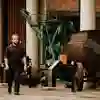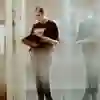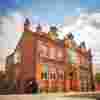



Illuminate the past. Tackle the present. Shape the future. Join us on a journey to gain historical knowledge and take on today’s most pressing challenges.
Our understanding of History influences how we live our lives today. At Hull, we balance the thrill of fresh discoveries with familiar topics. Along the way, you’ll develop key techniques for historians and gain transferable skills all employers value.
You’ll also get the chance to work with local museums, archives and galleries. And take part in voluntary work placements with the Hull History Network.
About this course
You’ll engage with social and cultural history. With war and politics. With the powerful and the underdog. With sudden events. And with long-term change. You’ll uncover the historical roots of contemporary social, political and environmental challenges. From classical civilisations to modern communities, you’ll explore how all different periods of history continue to influence our world, and to help us understand it better.
Our assessments aim to reflect the real world. Instead of a series of exams, you'll be encouraged to express your ideas in a variety of ways. To criticise sources of historical information from newspapers to computer games. And to develop your own ideas through channels such as podcasts and online exhibitions. That way, you gain the range of skills you’ll need for the workplace.
You’ll benefit from the resources of a city steeped in history. Explore the Hull History Centre and the world renowned Wilberforce Institute. And, of course, there’s the Brynmor Jones Library. Here, we have more than a million books, journals and periodicals. As well as extensive digital resources drawn from libraries and archives across the world.
Look back to the past to see into the future.
Module options
Filters
History of Freedom
What does it mean to be free and how has the answer to this question changed over time? In ancient and medieval times, there was no expectation of individual freedom as we understand it today, rather there were degrees of ‘unfreedom’ such as slavery, serfdom, or vassalage. Later, in the age of empire, race determined who could be enslaved, and the slave trade’s legacies of racism persist into the present day: the civil rights movements and the struggle against apartheid are known as some of the most prominent recent fights for freedom. Nonetheless, the idea of freedom has far broader connotations, and you will also have the flexibility to explore diverse issues such as religious, cultural or personal freedoms.
compulsory
20 credits
Revolutions: Continuity and Change
Revolutions are processes and events of profound and enduring change, but they are not just about politics. Before the great revolutions in America, France, Haiti and Russia, global history experienced sweeping changes in society, ideas and technology. Revolutions are not modern phenomena, and they do not belong strictly to Europe: they are ancient and they have taken place all over the globe since the beginning of ‘recorded’ history. This module will widen your perspective on ‘revolutions’ by examining a number of revolutionary moments in world history, from ancient times to the present. These will range across technological, social, religious and political revolutions.
compulsory
20 credits
All Roads Lead from Rome: the Classical Present
No matter how modern we think we are, we’re still shaped by the classical past. In every age, the classical world has been used as a benchmark for good taste and has been re-invented for present purposes. Using the artworks, archaeology and artefacts of material and visual culture, this module will explore topics such as how the classical world provided a blueprint for the projection of power through imagery and architecture. From the posturing of great leaders, such as the portraits of Napoleon, to the grand civic buildings of Washington DC or Albert Speer’s designs for Hitler’s Berlin, the classical world has been influential throughout history.
compulsory
20 credits
Human Worlds
How have humans shaped their environment, and how has the environment shaped them in return? These questions have controlled how and where we live. The availability of resources has encouraged migration and movement from the trade routes of the Silk Road across Asia to the imperial web of coaling stations that developed for the projection of naval power. How do cities grow – like St Petersburg, Delhi or Paris, built and rebuilt that has affected how generations of inhabitants later would live their lives?
compulsory
20 credits
World War Tudors: Rethinking British History
Why are TV programmes so obsessed with certain episodes in British history such as the Tudors and the world wars? What idea of Britain is conveyed when we focus on a narrow range of stories like Boudicca’s fight against Rome, victory at Agincourt, Henry VIII’s wives or the Battle of Britain? What gets left out of British history in these simplified versions of the past? This module will invite you to critique popular culture, such as television documentaries or computer games, and to create different fresh ideas for how you think the public could engage with an aspect of the past that inspires you.
compulsory
20 credits
History in the News
What are the historical roots of what is happening now? You will help to shape the course by identifying some of the most pressing and interesting issues of the world today. We will then work together to research different perspectives on these themes by finding out historical background and historical parallels that help to explain them. The decision as to what we should explore together lies in your hands.
compulsory
20 credits
Global Britain and its Past
Develop specialist skills such as using technology to map time and space, visual literacy, or oral history interviewing whilst learning about the expansion of the English across the British Isles and then across the world as an empire was built.
compulsory
20 credits
History: Then and Now
This module explores how historians shape and debate the past. Should we study the past on its own terms as we act as neutral observers who are guided by what the sources tell us, or do historians mould the past into their own image, re-writing history for new purposes depending on each historian’s subjective preferences? In this module, we will consider these questions of objectivity, facts, bias, distortion, as well as the need for historians to return to the past and consider it from points of view that are relevant to the present.
compulsory
20 credits
Group Project
Using all of the skills you’ve developed through the programme to date to create a piece of public-facing history in cooperation with your peers. You’ll have the freedom and flexibility to choose the historical topic and the means by which you present it. Possible ideas include an exhibition, podcast, a website or something else that you find an effective tool for exploring the past.
compulsory
20 credits
Our facilities

Watchlist
Dr Jenny Macleod
Course overview
1 min
History at Hull
Course Highlight
5 mins
Life on campus
University life
2 mins
Featured academics
Our historians are leaders in their research fields, which range in time from prehistory to the late twentieth century, and in space from Hull to New Zealand and the Americas.
We have particular expertise in medieval history, women’s history, indigenous history, maritime history, and the history of migration and diasporas.
Together we form a lively, approachable and welcoming group, and seek to bring our expertise and passion for our subject into the classroom.

Dr Colin Veach
Senior Lecturer in Medieval History
Colin’s research investigates the articulation of power in medieval Britain and Ireland, placed in the context of Europe. He’s a Fellow of the Royal Historical Society, and a member of the peer review college for the Irish Research Council (IRC).

Dr Catherine Baker
Reader in 20th Century History
A specialist in post-Cold War history, international relations and cultural studies, Dr Baker’s initial research explored the politics of national identity and popular music during and after the Yugoslav Wars.
Entry Requirements
What do I need?
This course is currently available through Clearing, which means our entry requirements are a bit different to what they would normally be.
At Hull, you're a name not a number. During Clearing, we look at all of your qualifications and experience, not just your academic grades. We may be able to offer you a place whatever your situation. Get started by completing our eligibility checker, and find out immediately if you could study at the University of Hull.
Have questions? Our admissions team will be happy to help.
Fees & Funding
How much is it?

Future prospects
The way we teach history gives you skills that employers value. You’ll learn how to analyse complex data. How to present clear and coherent arguments to diverse audiences. And by explaining, supporting and defending your ideas, you’ll become a better communicator.
You'll also gain teamworking skills through presentations and seminar discussions. And you'll learn how to plan, research and manage your own time through essays.
With a History degree, you can pursue a range of careers, such as historian, heritage manager, archaeologist, museum conservator, researcher, auctioneer, archivist or teacher. Hull graduates also work in journalism, the Civil Service, marketing, law, and politics.
Become part of the next generation of futuremakers
Like what you've seen? Then it's time to apply.
The standard way is to apply through UCAS. This will give you the chance to showcase your skills qualities and passion for the subject, as well as providing us with your academic qualifications.
Not ready to apply yet?
Visit our next Open Day, and see all that the University of Hull has to offer. Talk to our lecturers about your subject, find out what university is really like from our current students, and take a tour of our beautiful campus and amazing facilities.
You may also be interested in...
100% of History at Hull received the top grade of 4* for Research Impact, and is also 18th for Historical Research in the UK, according to the Research Excellence Framework (REF) 2021.
History: Ranked 7th in the UK for learning opportunities. National Student Survey (NSS) 2025, HEIs only.
History: Ranked 10th in the UK for Teaching Quality. The Times and Sunday Times Good University Guide 2026.
History is ranked 4th in the UK for Satisfied with Feedback. The Guardian University Rankings 2026.
All modules presented on this course page are subject to availability and this list may change at any time.